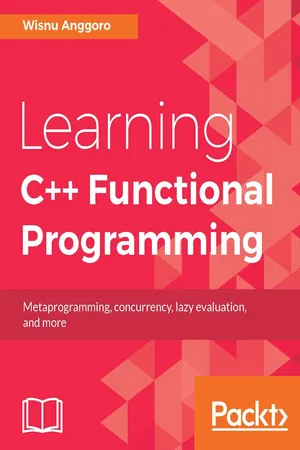
- 304 pages
- English
- ePUB (mobile friendly)
- Available on iOS & Android
Learning C++ Functional Programming
About this book
Apply Functional Programming techniques to C++ to build highly modular, testable, and reusable codeAbout This Book• Modularize your applications and make them highly reusable and testable• Get familiar with complex concepts such as metaprogramming, concurrency, and immutability• A highly practical guide to building functional code in C++ filled with lots of examples and real-world use casesWho This Book Is ForThis book is for C++ developers comfortable with OOP who are interested in learning how to apply the functional paradigm to create robust and testable apps.What You Will Learn• Get to know the difference between imperative and functional approaches• See the use of first-class functions and pure functions in a functional style• Discover various techniques to apply immutable state to avoid side effects• Design a recursive algorithm effectively• Create faster programs using lazy evaluation• Structure code using design patterns to make the design process easier• Use concurrency techniques to develop responsive software• Learn how to use the C++ Standard Template Library and metaprogramming in a functional way to improve code optimizationIn DetailFunctional programming allows developers to divide programs into smaller, reusable components that ease the creation, testing, and maintenance of software as a whole. Combined with the power of C++, you can develop robust and scalable applications that fulfill modern day software requirements. This book will help you discover all the C++ 17 features that can be applied to build software in a functional way.The book is divided into three modules—the first introduces the fundamentals of functional programming and how it is supported by modern C++. The second module explains how to efficiently implement C++ features such as pure functions and immutable states to build robust applications. The last module describes how to achieve concurrency and apply design patterns to enhance your application's performance. Here, you will also learn to optimize code using metaprogramming in a functional way.By the end of the book, you will be familiar with the functional approach of programming and will be able to use these techniques on a daily basis.Style and approachThis book uses a module-based approach, where each module will cover important aspects of functional programming in C++ and will help you develop efficient and robust applications through gaining a practical understanding.
Tools to learn more effectively

Saving Books

Keyword Search

Annotating Text

Listen to it instead
Information
Diving into Modern C++
- Understanding several new features in modern C++
- Implementing the C++ Standard Libraries in modern C++
- The use of the Lambda expression and all features included in C++ Lambda
- Using smart pointer to avoid manual memory management
- Dealing with many return values using tuples
Getting closer with several new features in modern C++
Defining the data type automatically using the auto keyword
/* auto.cpp */
#include <iostream>
#include <typeinfo>
int main()
{
std::cout << "[auto.cpp]" << std::endl;
// Creating several auto-type variables
auto a = 1;
auto b = 1.0;
auto c = a + b;
auto d = {b, c};
// Displaying the preceding variables' type
std::cout << "type of a: " << typeid(a).name() << std::endl;
std::cout << "type of b: " << typeid(b).name() << std::endl;
std::cout << "type of c: " << typeid(c).name() << std::endl;
std::cout << "type of d: " << typeid(d).name() << std::endl;
return 0;
}

int add(int i, int j)
{
return i + j;
}
auto add(int i, int j)
{
return i + j;
}
auto add(int i, int j) -> int
{
return i + j;
}
int main()
{
// The body of the function
}
Table of contents
- Title Page
- Copyright
- Credits
- About the Author
- About the Reviewer
- www.PacktPub.com
- Customer Feedback
- Preface
- Diving into Modern C++
- Manipulating Functions in Functional Programming
- Applying Immutable State to the Function
- Repeating Method Invocation Using Recursive Algorithm
- Procrastinating the Execution Process Using Lazy Evaluation
- Optimizing Code with Metaprogramming
- Running Parallel Execution Using Concurrency
- Creating and Debugging Application in Functional Approach
Frequently asked questions
- Essential is ideal for learners and professionals who enjoy exploring a wide range of subjects. Access the Essential Library with 800,000+ trusted titles and best-sellers across business, personal growth, and the humanities. Includes unlimited reading time and Standard Read Aloud voice.
- Complete: Perfect for advanced learners and researchers needing full, unrestricted access. Unlock 1.4M+ books across hundreds of subjects, including academic and specialized titles. The Complete Plan also includes advanced features like Premium Read Aloud and Research Assistant.
Please note we cannot support devices running on iOS 13 and Android 7 or earlier. Learn more about using the app